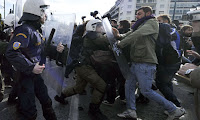THE DAILY TELEGRAPH: A wave of “extremism and xenophobia” will sweep across Europe unless political leaders take urgent action to deal with the debt crisis, Nick Clegg has warned.
The Deputy Prime Minister predicted that arguments in Britain about whether to pull out of the European Union would be “like a small side show compared to the rise of political extremism” in the next few years.
In his bleakest assessment to date, Mr Clegg admitted that his beloved European project faces a “huge” crisis of confidence as the public loses faith in the EU “as a whole”.
Mr Clegg’s intervention followed warnings from Cabinet ministers that the eurozone debt crisis is approaching a “moment of clarity” when it is “quite likely” that Greece will be forced out of the single currency.
In an interview with the German magazine, Der Spiegel, the Liberal Democrat leader said EU nations are “condemned to work with each other” but warned that nine European governments have “fallen” since 2009.
“Everybody should be more active,” he said. “At the moment, what’s happening is you have one emergency summit after another; you have one election after the other; you have one bail out after the other.
“This cannot carry on because the combination of economic insecurity and political paralysis, we know this from the history of our continent, is the ideal recipe for an increase in extremism and xenophobia. » | Tim Ross, and James Kirkup | Monday, May 21, 2012
THE SUNDAY TELEGRAPH: Ken Clarke attacks 'nationalist' eurosceptic Tories: MPs who want a referendum on membership of the European Union are “right-wing nationalists” who would bring "disaster" to Britain, Kenneth Clarke has said. ¶ The Justice Secretary, who is regarded as the most "europhile" Conservative Cabinet minister, said calls to consider withdrawing from the EU were "a dangerous irrelevance" to the economic crisis. » | Tim Ross, Political Correspondent | Sunday, May 20, 2012










